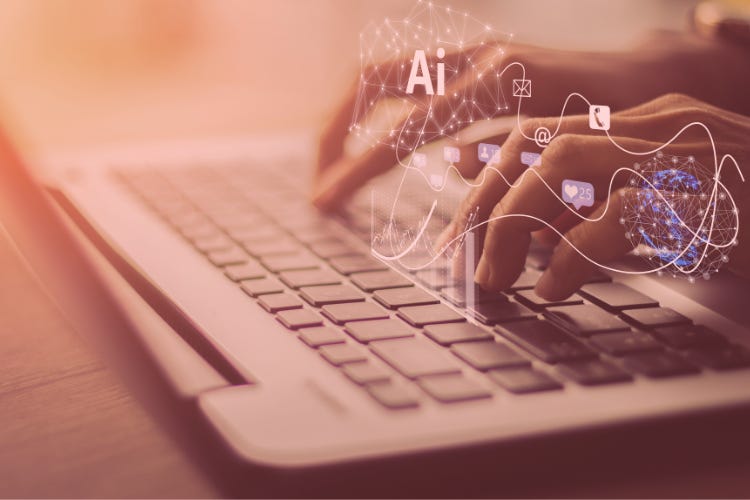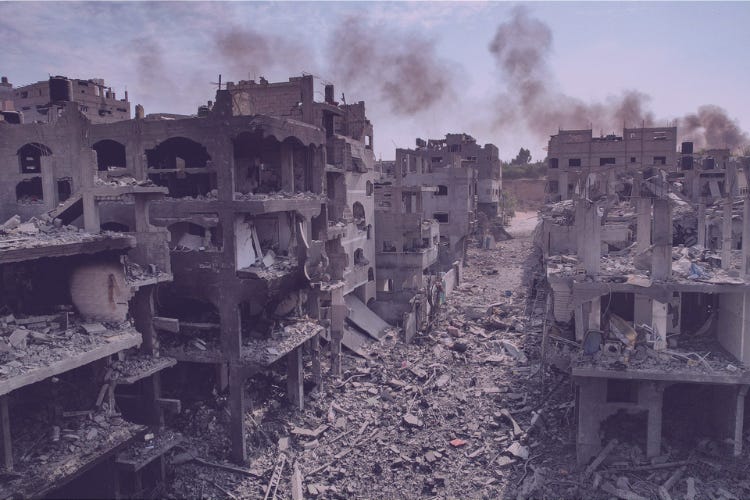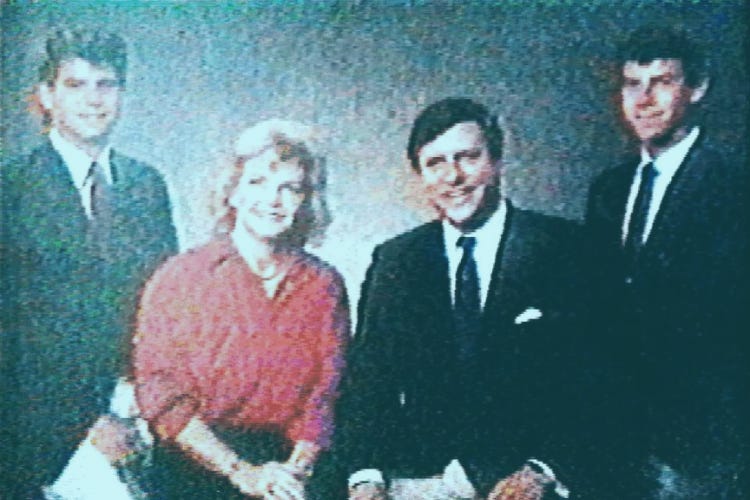After several months of writing here on Substack, I've come to realize that fully exploring each topic often requires more space than the format of my ICYMI newsletter comfortably allows. So starting this week, I’m adjusting the format to make it more focused and digestible. I'll also be sharing longer, in-depth articles, where I will explore topics that require deeper reflection and analysis. Thank you for your continued support and for being part of this journey with me!
In our lifetime we will be free
One day when the light shines we will be free
In our lifetime we will be free
And they can bury us
But they will find out we are seeds
1. How technology is changing us, as humans
One of the most fascinating interventions in the academic understanding of evolution is the idea that we became bipeds so that we could use our hands to communicate. André Leroi-Gourhan argued that our ancestors stood upright not just to move more efficiently or to hunt, but to free their hands for something more profound—gesture, tools, and the beginnings of culture. It was the ability to use our hands that unlocked the potential for creativity, symbolic thinking, and connection.
One of my favorite contemporary philosophers, Bernard Stiegler, takes this idea even further, suggesting that our relationship with tools and technology is actually an extension of our evolutionary path. He argued that humans are unique because we externalize parts of ourselves—our memory, our experiences—into tools. We write things down so we don't forget, we build technologies that act as prosthetic extensions of our minds and bodies. This process of externalization, he claims, is not separate from evolution—it is evolution, allowing us to accumulate knowledge across generations.
This idea changes the way we might think about our current technological moment. I learned about “griefbots” from the article below. They are digital tools that try to recreate a lost loved one’s personality through texts and conversations. Instead of seeing this as an unnatural, alienating experience, we could recognize it as a continuation of a very human impulse: to remember, to create, to communicate across time. From cave paintings to photos to griefbots, we’re always trying to hold onto our experiences, to give them form outside of ourselves.
We often fear that technology will strip away what makes us human, but the opposite could also be true. Perhaps these technological extensions that expand our reach and our memory are helping us express what is most essentially human. From the moment we stood upright to free our hands, we have been reaching out, making, remembering. Today, as we instinctively engage with technology, we might just be evolving into a deeper expression of what it means to be human. As Stiegler warns, the real danger lies in the corporate interests that profit by capitalizing on our human instincts, rather than the technology itself.
2. Their promise: endless war
They have told us they have no answer other than endless war. This week’s vice-presidential debate made it clear that neither candidate is willing to promise peace. Instead, we are offered a dark vision of more weapons, more conflict, more devastation. The idea of Greater Israel has become a dangerous obsession—a vision that threatens not just the people of the region, but the stability of the entire world.
It’s every so often that a group of people becomes entranced by beliefs that are perilous to all humanity, and the project of Greater Israel is one such belief. Zionism asserts that Israel belongs solely to the Jewish people, granted by divine right. This serves as a powerful justification for domination, colonization, apartheid, and abject aggression. Zionism offers no path toward peace, and only a path toward endless racial subjugation, enforced through endless war. The belief that a single group is inherently above others, that exclusion and expansion are somehow justified, has led us to a dangerous precipice.
What makes this even more terrifying is how these old ambitions—of colonial expansion and domination—have resurfaced as though we never entered the nuclear age. The days of traditional colonialism came to an end because the world learned that such reckless expansion was incompatible with the new reality of mutually assured destruction. But today, it seems like we’ve forgotten this lesson. Even if Iran’s capacity to arm nuclear weapons in a matter of less than two weeks doesn’t frighten us, we should be aware that Russia, a nation with a nuclear arsenal comparable to ours, has now ordered its citizens to leave Israel and Lebanon. This is not a conflict that will be easily controlled, yet our leaders continue to play their dangerous games.
The alliance between Western powers, Zionist expansion, and profit-driven politicians guarantees that we are being promised endless war. The United States continues to pour billions into military aid for Israel, while neglecting critical needs at home. People of conscience—especially Black and brown—across the globe resist this vision—we refuse to accept that violence, colonialism, and environmental destruction are the inevitable trajectory of humanity. We reject the notion that this is the best we can hope for.
So we have to ponder: why are we allowing this to continue? Why are we letting ourselves be dragged into another cycle of destruction? Why have we forgotten the catastrophic potential that lies in this escalation? The promise of endless war is not inevitable. We have the choice to imagine a future built on justice, dignity, and humanity. The power to resist, to reshape our world, is still in our hands, but the window is closing.
3. “What would you do, if we became you?”
Some songs can haunt you.
Meshell Ndegeocello’s "What Did I Do?" featured on her latest album, No More Water: The Gospel of James Baldwin found me in my sleep consciousness, showed up as I walked the streets of Brooklyn, and invited me to reintegrate memories of my father and my childhood.
I grew up in a home with a room exclusively dedicated to books, with a desk in it dedicated only to writing. But it wasn’t until after my father died that I found his essays and considered the intellectual history with which he engaged. I saw more carefully the furnishings in our home and the books on the shelves. The choices he made became much more clear. My dad was one of the exceptional Black boys born in the 1920s who received the gift of an exceptional education at a NYC public high school that was very much integrated. He and James Baldwin attended Dewitt Clinton High School at the same time in different grades.
I remember the day my dad taught me “the golden rule.” We were in Mount Vernon, NY and I was seated in the back of our newly acquired Mercedes Benz. “Do unto others as you would wish they do unto you - not as they do. As you would wish… they did unto you. Not as they do.” It was not long after this lesson that I threw up the orange soda I was trying for the first time. My first and last orange soda.
Having the car allowed us to go anywhere we wanted and perhaps it was only inside the car that my father found himself as himself - as the exceptional Ivy League educated man he was. Outside the car on the street he was just another Black man, stripped of his humanity, assumed to be less than, assumed not to have an intellectual or creative life. No matter the moments of sadness, anger, newness, wanting to run or to stand–no matter the times he wished he could punch himself out of the prison of his skin, he never became the thing that caused him to suffer; he always refused to put his boot on any neck. Instead he spent his life reaching his hand out to pull others up, serving the most underprivileged children of New York City for 44 years. My dad never aspired to join with white supremacy or to distinguish himself from other Black people or to assert himself as above others–for him that was fool's gold.
When I think of this line in Ndegeocello’s moving song, “what would you do, if we became you?” I feel profound pride in our struggle as Black people. Oftentimes our struggle for justice forces us to choose to forgo forms of wealth, status and power that would align us with the very thing that causes our suffering, the thing that makes us Black and blue. When I look at the Zionist movement’s vision for Jewish people post-Holocaust, it makes me sad that their struggle, which could have been for the good of all humanity, has been co-opted by Western white supremacy. To escape suffering, they justified becoming the cause of suffering. What would you do, if we became you?
As we consider the prospect of another Black president and the first woman president, we should ask if this is the best direction for our struggle, for our legacy. What would you do, if we became you? Our struggle should mean more than becoming the thing we hate. New forms of white supremacy invite us, like Jews post-Holocaust, to align and partner with our oppressors. We must continue to resist this deep desire for freedom from their boot, because it’s really just a different kind of boot. It will separate us from the deepest part of our humanity and our heart of freedom.
My dear friend, the singer-songwriter, poet, essayist, and educator, Patsy Moore, shared this album as part of her visual newsletter found here on Patreon. You do have to sign up for a free trial to view it, but I promise you it is well worth it. Plus, you’ll be supporting an artist, activist and intellectual battling health issues while creating work that moves hearts the size of mountains.
4. Who are the real monsters?
Regardless of what you think of Netflix's retelling and fictionalization of this horrific event, Monsters: The Lyle and Erik Menendez Story forces us to question the utility of life without parole. No one murders their parents with such brutality without underlying abuse of a severity that demands violent rejection. Their act reflects a psychological necessity—a desperate attempt to reclaim one’s sense of self after enduring profound trauma.
Monsters has been the most popular show on Netflix for the last few weeks, and with good reason. The controversial series makes us reflect on how far we’ve come in understanding abuse, incest, and mental health. Back in the late 1980s, these issues were rarely talked about, and often misunderstood—particularly in the context of the Menendez case. Today, we understand how severe abuse—emotional, physical, and sexual—can strip away an individual’s identity.
Directed by Carl Franklin, Paris Barclay, and Michael Uppendahl among others, and featuring Nicholas Chavez and Cooper Koch as the Menendez brothers alongside Chloë Sevigny as Kitty Menendez, the series brings an intense and layered portrayal of trauma. Dallas Roberts plays Dr. Jerome Oziel, whose ethically fraught role in the case adds another layer of controversy. The direction captures the tension between the horrifying nature of the crime and the humanity behind it, moving between courtroom drama and deeply personal flashbacks.
The series has not been without criticism. Many found the depiction of the brothers’ alleged incestuous relationship exploitative. This may be true—these are real humans, who are still alive—but it offered insight into how incest is passed on, and profoundly difficult to escape. What would you do, if we became you? The ethical lines blur further with Oziel's character, whose involvement and breach of confidentiality have left many questioning his motives. Still, Monsters also highlights the renewed hope for the Menendez brothers' release: a petition was recently filed based on new evidence, including a letter Erik wrote in 1988 revealing the ongoing abuse, and a former Menudo member's recent claim that José Menendez raped him.
The prison abolition movement can seem extreme, especially in cases as brutal as this one. But the series invites us to reconsider: what does justice look like for children whose entire lives have been a form of prison, filled with abuse and control? Monsters urges us to grapple with these questions. Despite its flaws, the show is worth watching for its raw performances, compelling direction, and its broader political statement about trauma, justice, and the limits of our current penal system.
Monsters: The Lyle and Erik Menendez Story
Thanks for reading! Please like, comment and share. See you next week!








It’s an interesting take on technology. And in a way, i totally agree. The danger in it isn’t technology itself - it’s how it interacts with our thought process. And our own shallow understanding of that process. Where many philosophers fall down for me is that they simply don’t enquire into that fundamental - it is double edged. It brought us the wheel - this is a wow of mega proportions. It has unlocked secrets of how stars function. Wow indeed. But it has also unleashed this barbaric mess of a society rife with exploitation, inequality etc. And that all started eons ago with the first division. I and my thoughts.
An I born in thought. That doesn’t really exist and yet we’ve exalted this generation upon generation, the divisional crack expanding and forking with a hyperbolic acceleration to the point we can’t see reality anymore through the shattered windshield of our thought addled mind. Throughout this, we’ve also used technology as the accelerator pedal of that internal division. And our love affair with it is now driving inequality, exploitation and increased brutality. Even if we solve the understanding thought and resultant systemic problems issue, the mineral and energy problems - lithium etc, remain. The impact of providing technological equality around the world based upon the current rich nation standard would be catastrophic. I’m not stating that’s what you’re arguing for by the way! I’m kind of just rambling half formed ideas at this stage… suffice as to say, glad to have encountered your work. I’ll be checking more out. Thought provoking is always good - er, with the caveat outlined above ;)
I also appreciate your take on Monsters. I wasn't planning on watching it because I really can't stomach these sensational biopics about still living people. I do believe the Menendez brothers did what they did in order to escape the trauma they were out through as children, but this show looked exploitative. Maybe I will give it a try now. And I love Chloë Sevigny, so there's that.